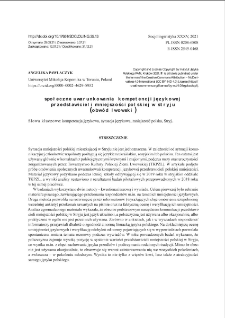- Search in all Repository
- Literature and maps
- Archeology
- Mills database
- Natural sciences
Advanced search
Advanced search
Advanced search
Advanced search
Advanced search

Object
Title: Social Determinants of the Linguistic Competence of Polish Minority Representatives in Stryi (the Lviv Region)
Publisher:
Instytut Języka Polskiego Polskiej Akademii Nauk
Place of publishing:
Abstract:
The situation of the Polish minority living in Stryi is not clear-cut. Depending on the communication situation, members of the community speak Ukrainian, Russian or Polish. The latter is used mainly in contacts with Polish-speaking relatives and friends, during church masses and celebrations held at the Society of Polish Culture of the Lviv Region (TKPZL). The article attempts to discuss the social conditions of the linguistic competence of the Polish minority representatives. The language material was obtained during the summer school held in 2019 at the Stryi branch of TKPZL, its results were compared with those of the 2018 pilot study at the same institution.Two methods were used in the research – a questionnaire and an interview. The aim of the first one was to collect written material on the beliefs of respondents, among others, about their language skills. The second method allowed the informants (expressing their willingness to discuss the previously completed questionnaire) to develop their written beliefs and the actual assessment and verification of their skills.The analysis of the collected material showed that the Ukrainian language is currently the basic communication tool for the representatives of the Polish minority in Stryi, and the Polish language is used either occasionally or practically not at all. Both in the questionnaires and in the interviews, the respondents/informants took care to comply with the literary norm of the Polish language. The spontaneous change of the topic of the conversation during the interviews allowed for a more precise assessment of language skills and the verification of deviations from the norm in the statements. In the course of the conducted research, it was shown that the Polish language has a high position in the value system of the Polish minority representatives in Stryi, which stems from, among others, the will to preserve the language of the ancestors and maintain family traditions. Although nowadays it is used occasionally, there has been an increased interest in it in all generations, especially in the younger generation, which results not only from blood ties, but also from its attractiveness.
Relation:
Volume:
Start page:
End page:
Detailed Resource Type:
Format:
Resource Identifier:
click here to follow the link ; oai:rcin.org.pl:233310
Language:
Language of abstract:
Rights:
Terms of use:
Copyright-protected material. May be used within the limits of statutory user freedoms
Access:
Object collections:
- Digital Repository of Scientific Institutes > Partners' collections > Institute of Polish Language PAS
- Digital Repository of Scientific Institutes > Partners' collections > Institute of Polish Language PAS > Serials
- Digital Repository of Scientific Institutes > Partners' collections > Institute of Polish Language PAS > Filds of science > Humanities > Linguistics > Sociolinguistics
- Digital Repository of Scientific Institutes > Partners' collections > Institute of Polish Language PAS > Offprint
- Digital Repository of Scientific Institutes > Literature > Journals/Articles
- Digital Repository of Scientific Institutes > Scientific data and objects > Humanities and Social Sciences > IJP PAN files
Last modified:
Jan 20, 2022
In our library since:
Jan 20, 2022
Number of object content downloads / hits:
84
All available object's versions:
https://rcin.org.pl./publication/270303
Show description in RDF format:
Show description in RDFa format:
Show description in OAI-PMH format:
| Edition name | Date |
|---|---|
| Społeczne uwarunkowania kompetencji językowej przedstawicieli mniejszości polskiej w Stryju (obwód lwowski) | Jan 20, 2022 |
Objects Similar
Głuszkowski, Michał
Jersche, Alexander (18..-19..). Redaktor Walter, R. Platenik. Redaktor
Lipiński, Wojciech
Barwiński, Marek Leśniewska, Katarzyna
Derlicki, Jarosław
Jeliński, Edward (1950– )
Bińczyk, Ewa

 INSTYTUT ARCHEOLOGII I ETNOLOGII POLSKIEJ AKADEMII NAUK
INSTYTUT ARCHEOLOGII I ETNOLOGII POLSKIEJ AKADEMII NAUK
 INSTYTUT BADAŃ LITERACKICH POLSKIEJ AKADEMII NAUK
INSTYTUT BADAŃ LITERACKICH POLSKIEJ AKADEMII NAUK
 INSTYTUT BADAWCZY LEŚNICTWA
INSTYTUT BADAWCZY LEŚNICTWA
 INSTYTUT BIOLOGII DOŚWIADCZALNEJ IM. MARCELEGO NENCKIEGO POLSKIEJ AKADEMII NAUK
INSTYTUT BIOLOGII DOŚWIADCZALNEJ IM. MARCELEGO NENCKIEGO POLSKIEJ AKADEMII NAUK
 INSTYTUT BIOLOGII SSAKÓW POLSKIEJ AKADEMII NAUK
INSTYTUT BIOLOGII SSAKÓW POLSKIEJ AKADEMII NAUK
 INSTYTUT CHEMII FIZYCZNEJ PAN
INSTYTUT CHEMII FIZYCZNEJ PAN
 INSTYTUT CHEMII ORGANICZNEJ PAN
INSTYTUT CHEMII ORGANICZNEJ PAN
 INSTYTUT FILOZOFII I SOCJOLOGII PAN
INSTYTUT FILOZOFII I SOCJOLOGII PAN
 INSTYTUT GEOGRAFII I PRZESTRZENNEGO ZAGOSPODAROWANIA PAN
INSTYTUT GEOGRAFII I PRZESTRZENNEGO ZAGOSPODAROWANIA PAN
 INSTYTUT HISTORII im. TADEUSZA MANTEUFFLA POLSKIEJ AKADEMII NAUK
INSTYTUT HISTORII im. TADEUSZA MANTEUFFLA POLSKIEJ AKADEMII NAUK
 INSTYTUT JĘZYKA POLSKIEGO POLSKIEJ AKADEMII NAUK
INSTYTUT JĘZYKA POLSKIEGO POLSKIEJ AKADEMII NAUK
 INSTYTUT MATEMATYCZNY PAN
INSTYTUT MATEMATYCZNY PAN
 INSTYTUT MEDYCYNY DOŚWIADCZALNEJ I KLINICZNEJ IM.MIROSŁAWA MOSSAKOWSKIEGO POLSKIEJ AKADEMII NAUK
INSTYTUT MEDYCYNY DOŚWIADCZALNEJ I KLINICZNEJ IM.MIROSŁAWA MOSSAKOWSKIEGO POLSKIEJ AKADEMII NAUK
 INSTYTUT PODSTAWOWYCH PROBLEMÓW TECHNIKI PAN
INSTYTUT PODSTAWOWYCH PROBLEMÓW TECHNIKI PAN
 INSTYTUT SLAWISTYKI PAN
INSTYTUT SLAWISTYKI PAN
 SIEĆ BADAWCZA ŁUKASIEWICZ - INSTYTUT TECHNOLOGII MATERIAŁÓW ELEKTRONICZNYCH
SIEĆ BADAWCZA ŁUKASIEWICZ - INSTYTUT TECHNOLOGII MATERIAŁÓW ELEKTRONICZNYCH
 MUZEUM I INSTYTUT ZOOLOGII POLSKIEJ AKADEMII NAUK
MUZEUM I INSTYTUT ZOOLOGII POLSKIEJ AKADEMII NAUK
 INSTYTUT BADAŃ SYSTEMOWYCH PAN
INSTYTUT BADAŃ SYSTEMOWYCH PAN
 INSTYTUT BOTANIKI IM. WŁADYSŁAWA SZAFERA POLSKIEJ AKADEMII NAUK
INSTYTUT BOTANIKI IM. WŁADYSŁAWA SZAFERA POLSKIEJ AKADEMII NAUK


































